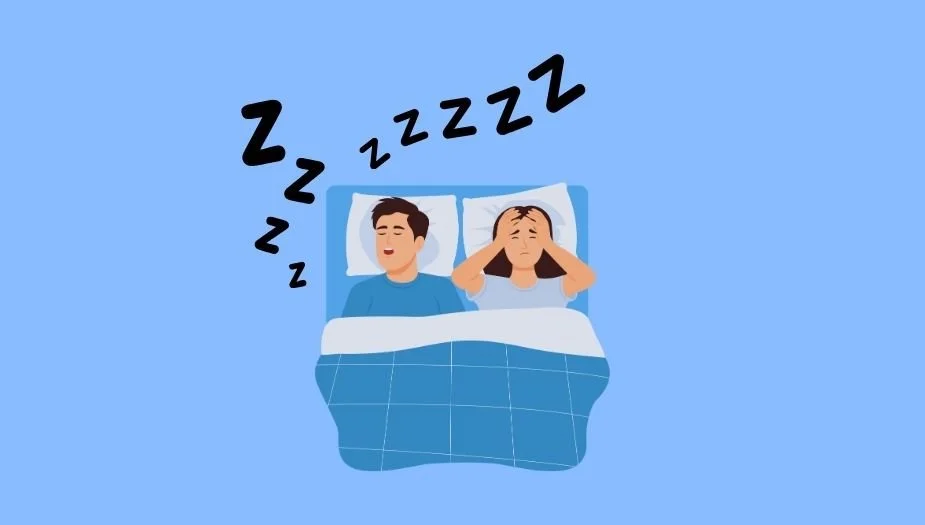When Your Partner Snores: How to Get the Sleep You Desperately Need
Prioritize Your Sleep, No Apologies
You’ve had a long day. Meetings, deadlines, a relentless inbox. You finally collapse into bed, ready for the deep, restorative sleep your body craves. And then—it begins. The symphony of snorts, gasps, and earth-shaking rumbles from the person next to you.
Snoring isn’t just a minor annoyance. It’s a legitimate threat to your sleep quality, your health, and—let’s be honest—your patience. If you’re a high-achiever running on fumes, sleep is non-negotiable. But when your partner’s nightly chainsaw impression disrupts your rest, you need a plan. Here’s how to reclaim your sleep (and sanity) without turning your relationship into a battleground.
How Your Partner’s Snoring Wrecks Your Health
You already know sleep is crucial, but let’s break down exactly how your partner’s snoring messes with your body and brain:
Fragmented Sleep: Even if you don’t fully wake up every time they snort, your sleep cycles get interrupted. That means less deep sleep (where memory consolidation, muscle repair, and immune function happen) and more time in light, low-quality sleep.
Increased Stress & Irritability: Chronic sleep disruption cranks up cortisol levels, making you more reactive, anxious, and less resilient to daily stressors.
Cognitive Impairment: A bad night’s sleep impacts focus, decision-making, and emotional regulation. Not ideal when you’re leading teams, negotiating deals, or managing high-stakes projects.
Increased Risk of Burnout: Sleep deprivation fuels burnout, plain and simple. It depletes your energy reserves, making it harder to recover from daily stressors.
Physical Health Consequences: Poor sleep is linked to weight gain, higher blood pressure, weakened immunity, and increased risk of chronic conditions like heart disease and diabetes.
Sleep isn’t a luxury; it’s a performance necessity. And if someone else’s snoring is sabotaging yours, it’s time for solutions.
Your Sleep, Your Sanity: Realistic Fixes for Dealing with a Snoring Partner
Let’s get practical. You need sleep, and you need it now. Here’s how to make it happen:
1. Wear Earplugs (But Choose Wisely)
Cheap foam earplugs might cut out some noise, but if your partner’s snoring is at “lawnmower inside a tunnel” levels, you need heavy-duty solutions. Look for high-NRR (Noise Reduction Rating) silicone or wax earplugs designed for deep sleepers.
2. White Noise Machines or Sleep Headphones
A high-quality white noise machine can drown out disruptive sounds, while noise-canceling sleep headphones with soothing soundscapes (or even just brown noise) can be a game-changer.
3. Sleep in Separate Rooms (Yes, Really)
If you have the space, consider a sleep divorce. It’s not a relationship failure; it’s a strategic decision to prioritize health. Plenty of happy, high-functioning couples sleep separately and enjoy better rest—and better mornings together as a result.
4. Adjust Their Sleeping Position
Snoring is often worse when someone sleeps on their back. If they’re open to trying, get them a body pillow or an anti-snore pillow that keeps them on their side.
5. Address the Root Cause
Snoring isn’t just a nuisance; it can be a sign of underlying health issues like sleep apnea. If their snoring is extreme, accompanied by choking sounds or pauses in breathing, encourage them to see a doctor. Untreated sleep apnea increases the risk of heart disease, stroke, and other serious conditions.
6. Consider Anti-Snoring Devices
From nasal strips to mandibular advancement devices (which help keep airways open), there are plenty of options that might reduce their snoring. Some work better than others, so some trial and error may be necessary.
7. Invest in a Smart Bed or Adjustable Base
Raising the head of the bed can sometimes reduce snoring. If you’re willing to invest, an adjustable base or a smart bed with anti-snoring features might be worth exploring.
8. Schedule Your Sleep Strategically
If your partner falls asleep instantly while you toss and turn, try getting to bed before them. That way, you’re already in deep sleep before the snoring starts.
The Delicate Art of Discussing Snoring Without a Fight
Now, what if your partner is sensitive about the topic? No one likes being told they sound like a broken air compressor at night. Here’s how to navigate the conversation without starting WWIII:
1. Lead with Empathy, Not Accusation
Instead of “You snore like a freight train, and I’m at my breaking point,” try: “I’ve been struggling with sleep lately, and I think your snoring might be a factor. I want to figure out a way for both of us to sleep better.”
Pro Tip:
They may truly have no idea exactly how loud or disruptive their snoring is.
It helps to record audio of their snoring and—with as much kindness and tact as possible—play it for them.
Understanding what you’re actually experiencing may encourage them to work to a solution.
Again, if you choose this route— be kind. This can be highly embarrassing and horrifying to your partner especially if they have no idea how bad it really it.
2. Use the ‘We’ Approach
Framing it as a shared challenge makes it less confrontational: “I’ve been reading about ways to improve sleep quality, and I found some strategies that could help both of us.”
3. Appeal to Their Health, Not Just Your Sanity
If they’re resistant, shift the focus: “I’m worried about your sleep too—snoring can sometimes be a sign of other health issues. Maybe it’s worth getting checked out?”
4. Offer Solutions, Not Just Complaints
No one likes being told there’s a problem without a way to fix it. Come prepared with potential solutions, whether it’s a sleep study, new pillows, or a white noise machine.
5. Set Boundaries If Needed
If your partner refuses to acknowledge the problem and it’s impacting your health, you have every right to prioritize your sleep. This might mean separate sleeping arrangements or other firm solutions that work for you.
Final Thoughts
You don’t need to suffer through sleepless nights out of politeness. Chronic sleep deprivation is a fast track to burnout, poor health, and lower performance in every area of life.
If your partner’s snoring is compromising your rest, take action. Experiment with solutions, have the conversation, and if necessary, sleep separately. Your well-being isn’t negotiable.
Because here’s the hard truth: You can’t show up as your best self—at work, in your relationships, in life—if you’re running on broken sleep. And no one (not even your snoring partner) benefits from that.
So take charge. Get the sleep you deserve. And let the snoring be someone else’s problem for once.
Article References
The sources cited in the article:
The Wall Street Journal (WSJ). "Dangers of Second-Hand Snoring: When Bedtime Is a Health Hazard." WSJ - Snoring
healthline. “How to Sleep When Someone Is Snoring.” healthline - How to Sleep When Someone Is Snoring
Sleep Foundation (SF). "When Your Partner Snores, No One Sleeps." SF - When Your Partner Snores, No One Sleeps
The New York Times (NYT). “My Partner Snores. Are There Any Tricks to Getting Some Sleep?” NYT - My Partner Snores






